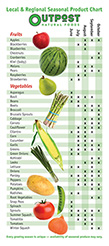The above information will be used only by Outpost Natural Foods for the express purpose of sending an e-newsletter. Outpost shopper information is never shared with other organizations or businesses.
Good Food >>
Can You Help the Honeybee?

Saving the bees:
What does pollination have to do with the board of directors at Outpost Natural Foods? Well, our role is to envision our cooperative, the way it relates with and provides for its owners under a variety of circumstances.
Honeybee populations are on the decline. Here are a few interesting facts to consider:
1. Over 100 fruit and vegetable plants, flowers, fruit and nut trees…..and all their varieties require pollination to bear fruit (cotton, too) --the majority of those plants require the efforts of honeybees
2. In 1947 there were 5.9 million domesticated commercial hives in the U.S.; by 1980, there were 4.5 million; By 2008, there were only 2.44 million
3. Colony Collapse Disorder (CCD), a phenomenon in which worker honey bees abruptly disappear, is to blame for the decreasing population of honeybees
4. Studies point to a variety of causes of CCD in the order of varroa mites, genetics, habitat loss and poor nutrition
5. Bee rental has increased 20% (it takes 800 commercial bee keepers and 1.6 million honey bee colonies to pollinate California almonds)
6. Hand pollination has increased in China
Consider the economic viability of the bee pollination industry. Honey bees are not likely to disappear entirely, but consider the cost of honeybee pollination services and those costs that would ultimately be passed on to consumers through higher food costs.
These actions, among others, are worth taking:
• Support local beekeepers by buying locally-produced honey and other beehive products (we have a number of them at Outpost!)
• Plant a bee-friendly garden and purchase wildflower seeds to support honeybees, native pollinators, and the environment. More information at dnr.wi.gov/wnrmag/2009/06/bees.htm
• Join or contribute to the one of the campaigns designed to help the honeybees such as the Foundation for the Preservation of Honey Bees at honeybeepreservation.org
• Watch the documentary Vanishing of the Bees at vanishingbees.com
• Consider becoming a beekeeper yourself: milwaukee.uwex.edu/agriculture/beekeeping
For more information on this topic:
What are YOU doing to support the health of our honeybees?
– Kathy Osowski, director
Comments
Bloggers
Archived Columns
Tags
Archives
-
February 2026 (1)
January 2026 (1)
December 2025 (1)
November 2025 (1)
October 2025 (1)
July 2025 (1)
April 2024 (1)
March 2024 (1)
February 2024 (1)
December 2023 (1)
August 2023 (1)
March 2023 (1)
February 2023 (1)
November 2021 (1)
September 2021 (1)
November 2020 (1)
October 2020 (1)
July 2020 (1)
June 2020 (1)
May 2020 (1)
February 2020 (1)
January 2020 (1)
December 2019 (1)
November 2019 (1)
October 2019 (1)
August 2019 (2)
May 2019 (1)
March 2019 (2)
January 2019 (1)
December 2018 (1)
November 2018 (1)
October 2018 (2)
September 2018 (1)
February 2018 (1)
November 2017 (2)
October 2017 (1)
July 2017 (2)
March 2017 (1)
February 2017 (1)
January 2017 (1)
December 2016 (2)
November 2016 (1)
August 2016 (2)
July 2016 (2)
March 2016 (2)
February 2016 (2)
January 2016 (1)
December 2015 (1)
October 2015 (3)
August 2015 (1)
July 2015 (2)
June 2015 (1)
March 2015 (2)
February 2015 (2)
January 2015 (2)
December 2014 (2)
November 2014 (1)
October 2014 (3)
August 2014 (2)
July 2014 (1)
June 2014 (2)
May 2014 (2)
April 2014 (1)
March 2014 (2)
February 2014 (2)
January 2014 (2)
December 2013 (1)
November 2013 (2)
October 2013 (1)
July 2013 (2)
June 2013 (1)
May 2013 (2)
April 2013 (1)
March 2013 (2)
February 2013 (1)
January 2013 (2)
December 2012 (3)
November 2012 (1)
October 2012 (3)
September 2012 (2)
August 2012 (4)
July 2012 (4)
June 2012 (6)
May 2012 (3)
April 2012 (4)
March 2012 (6)
February 2012 (8)
January 2012 (3)
December 2011 (4)
October 2011 (4)
September 2011 (3)
August 2011 (5)
July 2011 (7)
June 2011 (1)
May 2011 (2)
April 2011 (7)
March 2011 (10)
February 2011 (12)
January 2011 (11)
December 2010 (19)
November 2010 (13)
October 2010 (22)
September 2010 (16)
August 2010 (24)
July 2010 (33)
June 2010 (5)
May 2010 (52)
April 2010 (37)
March 2010 (55)
February 2010 (44)
January 2010 (46)
December 2009 (40)
November 2009 (26)
October 2009 (37)
September 2009 (34)
August 2009 (24)
July 2009 (21)
June 2009 (29)
May 2009 (30)
April 2009 (33)
March 2009 (16)
February 2009 (2)
January 2009 (5)
November 2008 (1)
October 2008 (1)
September 2008 (2)
August 2008 (3)
July 2008 (2)
June 2008 (6)
May 2008 (2)
April 2008 (10)
March 2008 (5)
February 2008 (5)
January 2008 (12)
December 2007 (5)
October 2007 (3)
August 2007 (3)
July 2007 (1)
June 2007 (5)
May 2007 (4)
April 2007 (6)
March 2007 (3)
February 2007 (3)
January 2007 (4)
December 2006 (2)
October 2006 (2)
September 2006 (5)
August 2006 (8)
0 (1)










